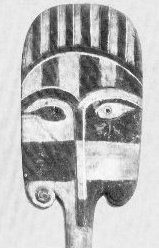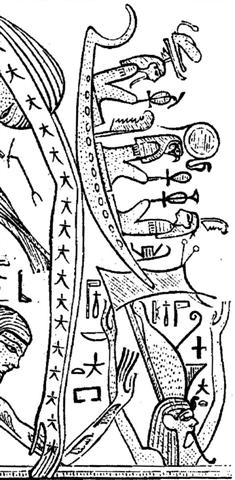North of the equator Mother Earth was soft, warm, and fruitful, south of the equator the soil of winter was cold and hard as a warrior. Heliacal Cancer (Tu) was close to the winter solstice. But on Hawaii Ku was fruitful:
... According to an
etiological Hawaiian myth, the breadfruit originated from the
sacrifice of the war god Ku. After deciding to live
secretly among mortals as a farmer, Ku married and had
children. He and his family lived happily until a famine seized
their island. When he could no longer bear to watch his children
suffer, Ku told his wife that he could deliver them from
starvation, but to do so he would have to leave them.
Reluctantly, she agreed, and at her word, Ku descended
into the ground right where he had stood until only the top of
his head was visible. His family waited around the spot he had
last been, day and night watering it with their tears until
suddenly a small green shoot appeared where Ku had stood.
Quickly, the shoot grew into a tall and leafy tree that was
laden with heavy breadfruits that Ku's family and
neighbours gratefully ate, joyfully saved from starvation
...
I was inspired by Ga3-11, with its head down at
the bottom. The preceding tagata vero followed by a solstice
(Janus) hau
tea could express a bad time, while the following honu glyph seems to be a dance
paddle (ao) and 4 days later a fish was rising:
| Ao
Large dance paddle.
1. Command, power, mandate, reign:
tagata ao, person in power, in command, ruler. 2.
Dusk, nightfall. 3. Ao nui, midnight. 4. Ao
popohaga, the hours between midnight and dawn.
Aô,
to serve (food); ku-âo-á te kai i ruga i te kokohu,
the food is served on a platter. Vanaga.
1. Authority, kingdom, dignity,
government, reign (aho); topa kia ia te ao,
reign; hakatopa ki te ao, to confer rank; ao
ariki, royalty; ka tu tokoe aho, thy kingdom
come. PS Mgv.: ao, government, reign. Mq.: ao,
government, reign, command. Sa.: ao, a title of
chiefly dignity; aoao, excellent, surpassing,
supreme. 2. Spoon; ao oone, shovel. 3. Dancing
club T. 3. Aonui (ao-nui 2), midnight. 4.
Pau.: ao, the world. Mgv.: ao, id. Ta.:
ao, id. Mq.: aomaama, id. Ma.: ao, id.
5. Pau.: ao, happy, prosperity. Mgv.: ao,
tranquil conscience. Ta.: ao, happiness. 6. Mgv.:
ao, cloud, mist. Ta.: ao, id. Mq.: ao,
id. Sa.: ao, cloud. Ma.: ao, id. 7. Mgv.:
ao, hibiscus. 8. Ta.: ao, day. Mq.: ao,
day from dawn to dark. Sa.: ao, id. Ma.: ao,
id. 9. Ta.: ao, a bird. Ha.: ao, id. 10.
Mq.: ao, respiration, breath. Ha.: aho,
breath. 11. Mq.: ao, to collect with hand or net.
Sa.: ao, to gather. Ma.: ao, to collect.
Ta.: aoaia, to collect food and other things with
care. Churchill. |
|
Rapa
1. To shine; shiny, polished; he-rapa
te moai miro, the wooden figurine is shiny,
polished. 2. Emblem, badge of timo îka (person
entrusted with putting a death spell on an assassin).
Rapahago, name of a spirit (akuaku),
anciently considered as benevolent; rapahago, a
fish. Raparapa, to dazzle; dazzled:
he-raparapa te mata. Marîa raparapa, calm,
smooth shiny sea. Vanaga.
1. Pau.: rapa, a fool, madness.
Ma.: rapa, a familiar spirit. 2. Pau.: rapa,
blade of a paddle. Mgv.: raparapahoe, id. Ta.:
rapa, id. Mq.: apa, id. Sa.: lapa,
flat. Ma.: rapa, flat part of a shovel. 3. Pau.:
rapae, a sand-pit. Ta.: rape, arapai,
id. 4. Mgv.: rapahou, primipara. Ma.: rapoi,
id. 5. Mgv.: raparapa, green. Ta.: rapa,
id. 6. Mgv.: raparapa, flat. Ta.: rapa, a
flat rock. Sa.: lapalapa, a flat coral. Ma.:
raparapa, the flat part of the foot. 7. Ta.:
raparapa, square. To.: labalaba, id. Ha.:
lapalapa, square (of timber, of a bottle, of a cow
yard). Churchill.
The ao and rapa differ
from each other mainly in size and in decoration, but
are otherwise closely related. Both were double-bladed
paddles twirled and shaken in the hand during ceremonial
dances. |

Ao is a strange word, used for instance in
Ao-tea-roa (New Zealand - the Long White Cloud). One of
the names of Easter Island was Rapa Nui (the Great Rapa).
The word also seems to have been used for such ideas as breath and
daylight. And for collecting with hand or by net - which idea could
have some relevance for understanding the 26th Chinese exceptional station
Extended Net - stretching from ε to μ Hydrae:
 |
 |
 |
 |
| Ga3-6 |
Ga3-7 |
Ga3-8 |
Ga3-9 (68) |
| *APRIL 12 |
13 |
14 (104) |
15 |
| MAY 25 |
26 |
27 |
28 (148) |
| Āshleshā-9 / Willow-24 |
Al Nathrah-6 |
Extended Net-26a |
ι Cancri (132.0), ρ Hydrae (132.4) |
| π¹ Ursa Majoris, δ HYDRAE (129.6), Al Minhar al Shujā, Museida (129.9) |
BEEHIVE and M44 (130.4), Xestus (130.5), Ascellus Borealis (130.9) |
η Hydrae (131.0), Ascellus Australis (131.4), Koo She (131.6), ε HYDRAE (131.9) |
| July 28 |
29 |
30 |
31 (212) |
|
'July 1 |
3 |
3 |
4 (185) |
| NAKSHATRA DATES: |
| *OCTOBER 12 |
13 |
14 |
15 (288) |
| NOVEMBER 24 |
25 |
26 (330) |
27 |
| Rotanev, ι Delphini (312.3), τ Capricorni (312.6), κ Delphini (312.7), SVALOCIN, υ Capricorni, υ Pavonis (312.8) |
Deneb Cygni (313.5), β Pavonis (313.6), δ Delphini (313.8) |
Al Sa’d al Bula'-21 / Dhanishta-24 / Girl-10 |
Baten Algiedi (315.8) |
| Yue (314.3), Gienah Cygni, η Cephei (314.5), γ Delphini (314.6), σ Pavonis (314.7), ALBALI (314.8)
Betelgeuze
|
| January 27 (392) |
28 |
29 (*314) |
30 |
| 'December 31 (365) |
'January 1 |
2 |
3 |
 |
 |
 |
 |
 |
 |
 |
|
Ga3-10 |
Ga3-11 |
Ga3-12 |
Ga3-13 (72) |
π |
Ga3-15 |
Ga3-16 |
|
*APRIL 16 |
17 (107) |
18 |
19 |
20 |
21 |
22 |
|
MAY 29 |
30 (150) |
31 |
JUNE 1 |
2 |
3 |
4 |
|
no star
listed (133) |
ζ Hydrae (134.1), ρ Cancri (134.2), ο Cancri (134.6) |
Acubens, Talitha Borealis (135.0), σ Cancri (135.2), ρ
Ursa Majoris (135.6) |
ν Cancri
(136.0), Talitha Australis (136.1), ω Hydrae (136.8) |
9h (137.0) |
no star
listed (138) |
π Cancri
(139.2), Miaplacidus (139.3), Tureis (139.8) |
|
σ¹ Ursa
Majoris (137.0), κ Cancri (137.3), τ Cancri (137.4),
Alsuhail (137.5), σ² Ursa Majoris (137.6), τ Ursa
Majoris (137.7),
ξ Cancri
(137.8) |
|
August 1 |
2 |
3 |
4 (216) |
5 |
6 |
7 |
|
'July 5 |
6 (187) |
5 |
| NAKSHATRA DATES: |
|
*OCTOBER 16 |
17 (290) |
18 |
19 |
20 |
21 |
22 |
|
NOVEMBER 28 |
29 |
30 |
DECEMBER 1 |
2 (336) |
3 |
4 |
|
μ
Aquarii (316.0) |
ε Equulei (317.8) |
no star listed (318) |
21h (319.6) |
χ Capricorni (320.0),
ν Aquarii (320.3), γ
Equulei (320.6), ο Pavonis (320.8) |
δ Equulei (321.7), φ
Capricorni (321.8) |
Kitalpha (322.0), Alderamin
(322.9) |
|
Armus (319.0), Dorsum
(319.3), Tsoo (319.7) |
|
January
31 |
February 1
(32) |
2 |
3 |
4 (400) |
5 |
6 |
|
'January
4 |
5 |
6 |
7 (372) |
8 |
9 |
10 |

The fish rising in Ga3-15 (in the day
after 3-14) could perhaps represent the Turtle (Tu)
rising from the waves of the World Ocean. We have
seen this particular fish earlier, viz. at
heliacal Wezen. Although there the rising fish
turned around again in the
day after Toga-nui in Ga2-16:
... The fish came
near the surface then, so that Maui's line was slack for a
moment, and he shouted to it not to get tangled.
But then the
fish plunged down again, all the way to the bottom. And Maui had
to strain, and haul away again. And at the height of all this
excitement his belt worked loose, and his maro fell off
and he had to kick it from his feet.
He had to do the rest with nothing
on ...
 |
|
 |
 |
 |
 |
|
Ga2-13 |
Ga2-14 |
Ga2-15
(45) |
Ga2-16 |
Ga2-17 |
|
0h |
*MARCH
22 |
23 |
24 |
EQUINOX |
|
MAY 3 |
4 |
5 (125) |
6 |
7 |
|
WEZEN
(107.1),
τ Gemini
(107.7), δ Monocerotis (107.9) |
no star
listed (108) |
λ Gemini
(109.4),
WASAT
(109.8) |
no star
listed (110) |
Aludra
(111.1), Propus (111.4), Gomeisa (111.6) |
|
July 6
(187) |
7 |
8 |
9 |
10 |
|
'June 9
(160) |
10 |
11 |
12 |
13 |
|
NAKSHATRA DATES: |
|
*SEPTEMBER 20 |
|
21 (264) |
EQUINOX |
23 |
24 |
|
NOVEMBER
2 |
3 |
4 (308) |
5 |
6 |
|
Al
Baldah-19 |
Aladfar (291.1), Nodus
II (291.5), ψ Sagittarii (291.6), θ Lyrae (291.8) |
ω Aquilae (292.1), ρ
Sagittarii (292.6), υ Sagittarii (292.7) |
Arkab Prior (293.0),
Arkab Posterior, Alrami (293.2),
χ Sagittarii (293.6) |
Deneb Okab (294.0), α
Vulpeculae (294.9) |
|
AL
BALDAH, Alphekka Meridiana (290.1), β Cor.
Austr. (290.2) |
|
January
5 (370) |
6 |
7 |
8 |
9 |
|
'December 9 |
10 |
11 (345) |
12 |
LUCIA |
|









